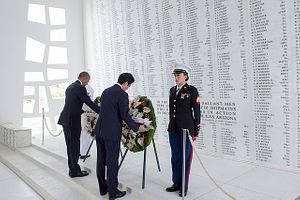On December 27, 2016, at around noon, Japanese Prime Minister Shinzo Abe visited the USS Arizona Memorial at Pearl Harbor together with U.S. President Barack Obama. It was the first ever such visit by an incumbent Japanese prime minister with an incumbent U.S. president, and it was used to pay tribute at the site of the Japanese attack that drew the United States into World War II. Abe’s visit marked the 75th anniversary of the attack and it is likely to play a significant role in the new chapter of Japan-U.S. relations.
At the memorial, the Japanese prime minister delivered a statement, in which he said:
“Even today, the horrors of war have not been eradicated from the surface of the world. There is no end to the spiral where hatred creates hatred. The world needs the spirit of tolerance and the power of reconciliation now — and especially now. Japan and the United States, which have eradicated hatred and cultivated friendship and trust on the basis of common values, are now, and especially now, taking responsibility for appealing to the world about the importance of tolerance and the power of reconciliation.”
In his address, Abe stressed the words “tolerance” and “reconciliation.” He used these terms seven and six times, respectively, making clear the intent of his statement.
The prime minister’s speech emphasized the strong determination of the U.S. and Japan to share with the world their success in forging the “power of reconciliation,” at a time of rising xenophobia and extreme nationalism worldwide. It is a historical anomaly for former enemy nations to form such a close alliance, despite different cultures, languages, religions and races.
Given this bilateral success, Abe clearly sees the alliance between Japan and the United States as a good way to demonstrate the power of reconciliation. It should be noted that this reconciliation has been made possible by the generosity of the American people, who were willing to be open-minded about a former enemy state. Without that spirit of generosity, bilateral reconciliation would never have been possible.
The message Abe delivered could be interpreted as being directed toward Obama’s successor, President Donald J. Trump. That is to say, the spirit of generosity shared as the greatest virtue among American citizens has served for many years as the basis for their country’s prosperity and safety. By stressing this point, Abe’s speech seems to have sent a message to the new administration to the effect that they will not easily yield to the temptation of xenophobia and that they will continue to embrace the spirit of generosity toward the rest of the world.
Abe seems to believe that Japan’s alliance with the United States, which benefited so greatly from the generosity of the American spirit, should serve not as an obsolete legacy of the postwar years, but rather as a constructive example of reconciliation for a world plagued by hatred.
As Abe himself said near the end of his statement, “… people all around the world, will continue to remember Pearl Harbor as the symbol of reconciliation.” And indeed, the “Day of Infamy,” as then U.S. President Franklin D. Roosevelt called it, seems now to symbolize more than anything the spirit of reconciliation.
Potential domestic repercussions meant that the chances of a Japanese prime minister visiting Pearl Harbor and a U.S. president visiting Hiroshima were long considered low. Yet Obama visited Hiroshima last year, where hugged a survivor of the bombing of Hiroshima, which took place 71 years earlier. During Abe’s visit to Pearl Harbor, the U.S. veterans who survived the Japanese attack reacted favorably to his speech, which also impressed those who saw it on television.
The Japan-U.S. relationship has a long history of growth, and encompasses a range of ongoing events. We can change the future course of bilateral relations, but not the past. Therefore, a shift in our general perception about past events can change the direction of the relationship in the future.
Meanwhile, a realization of a robust bilateral alliance could also change things. The Trump administration must redesign the bilateral relationship for the “future” in view of the “past,” as symbolized by the history of reconciliation, and the “present,” based on the robust alliance between our two countries.
Yuichi Hosoya is a professor at Keio University.

































